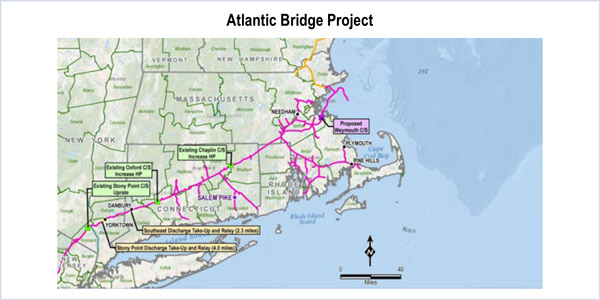By Michael Kuser
FERC on Monday denied requests by two Massachusetts municipalities for a stay of its January approval of the Atlantic Bridge Project, a $452 million expansion and upgrade of existing pipeline networks in New York and New England (CP16-9-001; CP16-9-004).
The two Boston-area communities — the town of Weymouth and city of Quincy — alleged that the prospect of construction was harming property values and making it “impossible for owners to sell their residences in the face of uncertainty.”
The commission quoted its own environmental assessment that found the project’s “pipeline segments primarily involve replacements of existing pipeline in the same location and would not require a new permanent pipeline easement. … Existing property values in these areas account for the presence of the existing pipeline and/or compressor station infrastructure.”
The Atlantic Bridge Project would expand Enbridge’s Algonquin Gas Transmission and Maritimes & Northeast Pipeline systems by 132,700 dekatherms/day to serve the New England and Canadian natural gas markets. The project would replace existing pipelines and expand existing compressor stations or build new ones in New York, Connecticut and Massachusetts, including a 7,700-horsepower compressor station to be built in Weymouth. (See Atlantic Bridge Project Approved by FERC.)
While the Weymouth compressor station would be a new facility, it will be built “on a previously disturbed industrial property … between an existing water treatment facility and electric power plant” and will not “result in other impacts that would significantly impact adjacent property values,” the commission said.
Quincy also contended that FERC’s order would cause harm by encouraging investors to back development of the separate Access Northeast pipeline project, which would run through the community. The commission found that contention “purely speculative” and said that the city did not allege what harm it would suffer from development of Access Northeast.
For Whom the Order Tolls
Weymouth additionally requested rehearing of a procedural tolling order issued by FERC Secretary Kimberly Bose in March.
The order stemmed from the commission’s lack of a quorum, which Weymouth argued left the town no recourse, either through the commission or the courts, to halt construction of the project. But FERC rebuked that contention, explaining that the order was only meant to give the commission “additional time for consideration of the matters” raised on rehearing. Weymouth was “free to seek stays from the commission or other relief,” it said.
Weymouth also called the tolling order unconstitutional, premising its argument upon a February 2017 D.C. Circuit Court of Appeals decision in PHH Corp v. Consumer Financial Protection Bureau, which held that “the consolidation of substantive decision-making authority into a single person eliminates ordinary constitutional checks and balances and is, therefore, unconstitutional.”
FERC found Weymouth’s argument inapplicable because the court “agreed to rehear the case en banc and vacated its earlier opinion. Moreover, the panel members differed on the appropriateness or necessity of the separation-of-powers ruling relied upon by Weymouth.”




